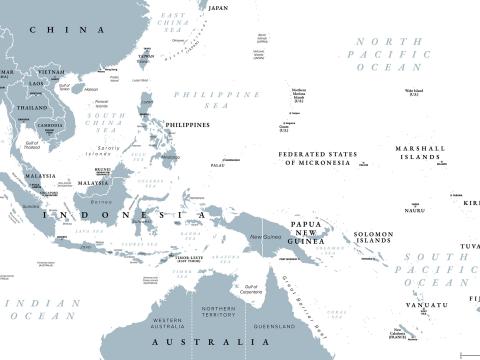President's Commentary: Valuing Indo-Pacific Partnerships Is No Game
In August, the Lowy Institute, an independent think tank in Sydney, Australia, released a report on “The Great Game in the Pacific Islands.”
The institute reports that Pacific Islanders have found their region, previously undervalued by “larger powers,” to be a focal point for strategic competition. “Geopolitical competition in the Pacific Islands region is intensifying. China is pushing to play a greater role in key sectors, including defense, law enforcement, emerging technologies and media.
Ishaan Tharoor, columnist at The Washington Post, explained that the term “Great Game” is rooted in a 19th-century clash of empires between Russia and Britain, who exerted influence across Eurasia. “Caught in the middle were an array of fading kingdoms, petty principalities and warring tribes whom the British and Russians variously conquered, co-opted or coerced to meet their grander strategic goals in competition with the other,” Tharoor wrote.
Various sources note that the term “Pacific Islands” is ambiguously defined, but it includes three island groups: Melanesia, Micronesia and Polynesia. The region holds strategic importance for multiple reasons:
- The islands are rich in culture and history and have made—and will continue making—many world-shaping contributions.
- The islands are located along global maritime routes for trade and military logistics.
- The area hosts military installations essential for ensuring security in the broader Indo-Pacific.
- The islands boast rich natural resources, including fisheries, minerals and potential undersea oil and gas reserves.
- And the Pacific hosts a mesh of undersea cables vital to modern, worldwide communications.
China is expanding its diplomatic reach and targeting strategically important countries and sectors to pursue its own agenda and attempting to impose its signature coercive tactics outside of international norms to extend its influence regionally for the benefit of the Chinese Communist Party.
Australia, the United States and other partners in democracy also are stepping up diplomatic efforts. As Kimberly Underwood reports in this issue of SIGNAL Magazine, the United States has recently opened embassies in Tonga, the Solomon Islands and Papua New Guinea and has recognized the Cook Islands and Niue as independent states for the first time.
The Lowy Institute indicates that the Pacific Island governments feel a need to push their partners for more, such as better trade deals, human mobility and national resilience.
“Pacific leaders are pushing for development approaches framed around regional identity, culture, and values, rather than geopolitical competition. All want to lift their countries out of aid dependency.”
Their goals align with those of Western democracies, who prioritize respect, trust and freedom for the security of all. U.S. Secretary of State Antony Blinken made that point in August during the Australia-U.S. Ministerial Consultations at the U.S. Naval Academy in Annapolis, Maryland.
“[It is] an era of mutual respect, mutual trust, mutual benefit with the United States and the Pacific Islands working together to advance a shared vision for the region that is free, that is open, that is connected, that is prosperous, that is secure, and that is resilient,” Blinken said. “When we talk about free and open, we mean a region where countries are free to choose their own path and their own partners; where problems can be dealt with openly, rules will be reached transparently and applied fairly; and goods, ideas and people will flow freely and lawfully across land, the seas, the skies and cyberspace.”
“Free-Open-Secure” happens to be the theme for this year’s TechNet Indo-Pacific conference taking place October 22-24 in Honolulu. Those three words, those three key words, are just as important to the island nations of Melanesia, Micronesia and Polynesia as they are to the rest of the region.
We share common values, face common threats and technological challenges, and we work together as equals, as teammates, and exert balanced influence to forge a free, open and secure path for the entire region.
For our friends and partners in the Indo-Pacific, the future is not a game.





Comments